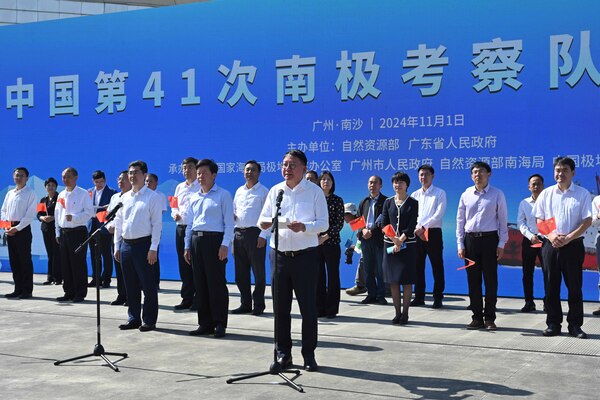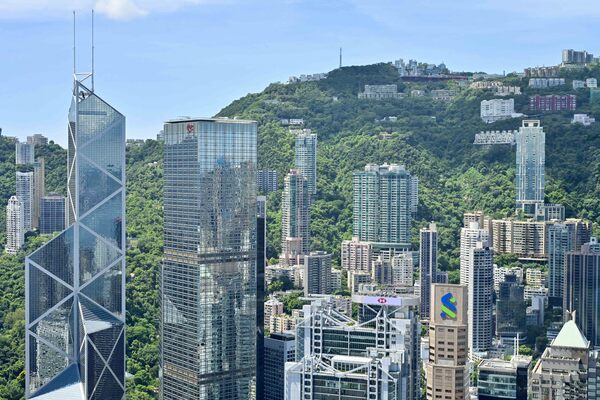Hong Kong Business News
香港商業資訊
FS OUTLINES FISCAL CONSOLIDATION PLAN
28-2-2024

In the 2024-25 Budget announced today, Financial Secretary Paul Chan proposed a number of measures to increase revenue and outlined a fiscal consolidation programme which aims to restore fiscal balance in a few years’ time.
Mr Chan said even though the Government strived to reduce expenditure as the COVID-19 pandemic had subsided, the total expenditure for 2023-24 reached $727.9 billion, representing an increase of 36.9% compared with 2018-19, of which operating expenditure rose substantially by 40.2% whereas operating revenue increased only 13.1%.
On capital works, owing to the fact that the Government has been pressing ahead with land and housing supply projects, along with other infrastructure works for improving the environment and people’s livelihood, the average annual expenditure has increased from about $76 billion over the past five years to about $85 billion in 2023-24.
Fiscal reserves have dropped to the current level of $733.2 billion.
Fiscal consolidation programme
The finance chief stated that the Government is taking steps to implement a comprehensive fiscal consolidation programme which focuses mainly on expenditure cut with a view to attaining fiscal balance in a few years’ time.
To contain the growth of operating expenditure, it will maintain zero growth in the civil service establishment, with the goal of containing the establishment at a level not exceeding that as at end-March 2021.
It will also implement a productivity enhancement programme under which recurrent government expenditure will be cut by 1% for two consecutive years. The resources thus saved will be reallocated internally for enhancing existing or introducing new public services.
To further contain the pace of expenditure growth, on the premise that such schemes as the Comprehensive Social Security Assistance Scheme and the Social Security Allowance Scheme will not be affected, all government departments need to cut recurrent government expenditure by another 1% in 2026-27.
Upon implementing such measures, the growth of operating expenditure will be reduced from the annual average of 7% in the past five years to an annual average of 2.2% in the coming five years, which is lower than the 5.5% increase in gross domestic product over the same period.
Additionally, Mr Chan pointed out that the annual expenditure of the Government Public Transport Fare Concession Scheme for the Elderly & Eligible Persons with Disabilities (ie the “$2 Scheme”) has increased over 200% from $1.3 billion in 2019-20 to about $4 billion in 2023-24.
Meanwhile, the annual expenditure of the Public Transport Fare Subsidy Scheme has doubled from $1.7 billion in 2019-20 to the revised estimate of about $3.5 billion in 2023-24.
As such, he requested relevant bureaus to conduct a review, to be completed within this year, on the mode of operation of two subsidy schemes that incur higher expenditure with a rapid expenditure growth rate.
Emphasising that that the Government has no intention of cancelling these schemes, he noted that the review aims to enable the continued provision of subsidies in a financially sustainable manner.
Turning to works projects, Mr Chan revealed that the Government has been pressing ahead with land and housing supply projects and proposed works projects for improving the environment and people’s livelihood.
Such projects comprise the Kai Tak Sports Park and Hospital Development Plan. It is estimated that expenditure on capital works will start reaching its peak in the next three years.
Mr Chan said: “The Government needs to contain its expenditure on infrastructure works at a sustainable level. To this end, relevant bureaus and departments have reviewed the cost-effectiveness of works projects and give due regard to priority and urgency to adjust the implementation schedule.”
In the Medium Range Forecast, capital works expenditure could be contained at about $90 billion per annum on average, Mr Chan explained, adding that this still represents a 17% increase over the average annual expenditure of $76 billion in the last five years.
While the Government is controlling the growth rate of total expenditure, Mr Chan stressed that the amount of resources it allocated to public services has still recorded a significant increase.
“For example, recurrent expenditures related to health, social welfare and education in 2024-25 amount to $343.7 billion, up by 7.3% over 2023-24 and by about 34.2% over five years ago.”
Increasing revenue
To increase the Government’s revenue, the Financial Secretary proposed to implement a two-tiered standard rates regime for salaries tax and tax under personal assessment starting from the year of assessment 2024-25.
In calculating the amount of tax for taxpayers whose net income exceeds $5 million and whose salaries tax or tax under personal assessment is to be charged at a standard rate, the first $5 million of their net income will continue to be subject to the standard rate of 15%, while the portion of their net income exceeding $5 million will be subject to the standard rate of 16%.
Mr Chan indicated that about 12,000 taxpayers will be affected, accounting for 0.6% of the total number of taxpayers chargeable to salaries tax and tax under personal assessment. Moreover, revenue will increase by about $910 million each year.
“Even with the two-tiered standard rates regime above in place, the new tax rates will still be lower than those of other advanced economies.”
Apart from that, the Government will introduce legislative amendments in the first half of this year to implement a progressive rating system for domestic properties with the aim of bringing the system into effect from the fourth quarter of 2024-25.
The new system will only affect domestic properties with rateable value over $550,000, which account for about 1.9% of the relevant properties. It is estimated that the system will contribute to an increase of about $840 million in government revenue annually.
Separately, Mr Chan announced that business registration fees, whose last adjustment was dated back in 1994, will increase by $200 to $2,200 per annum with effect from April 1. The Government estimated that its revenue will then go up by about $295 million each year.
To relieve the impact, the business registration levy of $150 payable to the Protection of Wages on Insolvency Fund will be waived for two years.
Furthermore, the Government proposes resuming, from January 1, 2025, the collection of the Hotel Accommodation Tax at a rate of 3%. It is anticipated that revenue will increase by about $1.1 billion a year, and the tax to be collected is estimated to only account for less than 1% of the total spending of overnight visitors in Hong Kong.
Separately, the finance chief said the Government will take forward the implementation of the global minimum tax proposal drawn up by the Organisation for Economic Co-operation & Development to address base erosion and profit shifting.
“We aim to apply the global minimum tax rate of 15% on large multinational enterprise groups with an annual consolidated group revenue of at least 750 million Euros and impose the Hong Kong minimum top-up tax starting from 2025.
“We are now conducting a consultation on the implementation of the above proposals and expect to submit a legislative proposal to the Legislative Council in the second half of this year.”
It is estimated that these proposals will bring in tax revenue of about $15 billion annually starting from 2027-28. That said, Hong Kong still maintain an edge over other tax jurisdictions in terms of tax competitiveness after the implementation of such proposals.
Bond issuance
Concerning the issuance of bonds, the Government plans to issue bonds of about $95 billion to $135 billion per annum in the next five years to drive the development of the Northern Metropolis and other infrastructure projects.
For the Kau Yi Chau Artificial Islands project, Mr Chan said it will carry on with conducting studies and take into account factors including public finance before drawing up a concrete implementation timetable.
The Financial Secretary concluded by saying: “The Government will continue to adhere strictly to fiscal discipline and keep the government debt at a prudent level.
“It is expected that the ratio of government debt to gross domestic product will be in the range of about 9% to 13% from 2024-25 to 2028-29, which is much lower than most of the other advanced economies.”
PREVIOUSNEXT
Latest Business News
最新商業資訊
CS sends off polar expedition team 1-11-2024

Chief Secretary Chan Kwok-ki attended the send-off event of China's 41st Antarctic expedition team at the Guangzhou Nansh...
Wealth scheme brokers set 1-11-2024
The China Securities Regulatory Commission and the Securities & Futures Commission of Hong Kong issued announcements ...
Talent and migration plans refined 1-11-2024

The Government today launched three measures to enhance the Top Talent Pass Scheme (TTPS) and the Quality Migrant Admissi...
HK to host Olympics body meeting 1-11-2024

The 2024 General Assembly of the Association of National Olympic Committees (ANOC) announced yesterday the successful bid...
